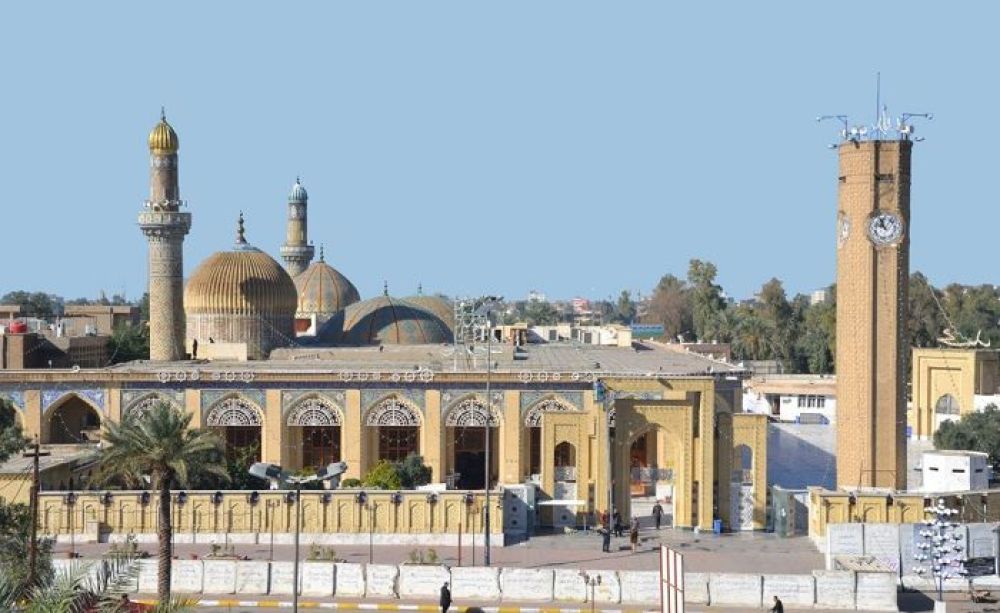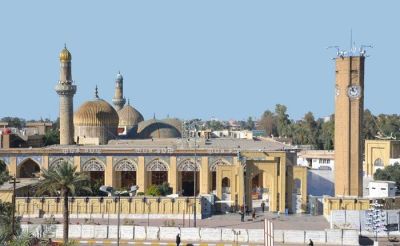

Embark on a journey through time with a guided historical tour of the Abu Hanifa Mosque, one of Baghdad's prominent Islamic landmarks. This tour delves deep into the mosque's rich history, dating back to the 8th century when it was erected in honor of the famous Islamic scholar, Imam Abu Hanifa. Visitors will explore the architectural beauty of the mosque, with its grand dome and minarets, and learn about the unique heritage that has played a significant role in the development of Islamic jurisprudence. Participants will also have the chance to observe traditional religious practices and Islamic culture, making this not just a tour but an educational experience that respects the ongoing spiritual significance of the site. Remember to dress modestly and prepare for an enlightening experience steeped in reverence and tranquility.
Participate in the spiritually uplifting experience of the Friday Prayer congregation at the Abu Hanifa Mosque. Every Friday, the mosque comes alive with the collective devotion of the Muslim faithful. The prayer, also known as 'Salat al-Jumu'ah,' is a vital practice in Islam and attending it at such a historic mosque adds to the solemnity of the occasion. Visitors can observe or join in this weekly event that brings together a diverse community of worshippers in a chorus of invocation and reflection. As this activity is a religious ritual, non-Muslim visitors are welcome to observe but are expected to maintain a respectful distance and remain quiet during the prayers. It's an opportunity to witness Islam's unifying power in a setting that's brimming with history and spirituality.
Immerse yourself in the tranquility of evening prayers and Quranic recitation at the Abu Hanifa Mosque. This daily event showcases the beautiful practice of 'Salat,' coupled with the melodious recitation of the Quran by experienced 'Qaris,' or reciters. This is a serene end-of-day activity; as the sun sets, the mosque is often bathed in a warm, golden hue, creating a peaceful atmosphere for reflection and worship. Visitors who may not be familiar with Islamic rituals can observe this profound experience, providing an insight into the daily religious lives of Muslims. The recitations are a testament to the oral tradition of Islam and a deep cultural heritage that has been preserved for generations. Observing the evening prayer is a way to connect with the local community and gain a deeper appreciation of Islamic culture.
The Abu Hanifa Mosque offers a series of cultural lectures intended to educate visitors on various aspects of Islamic history, jurisprudence, and theology. These sessions are often led by learned scholars and theologians who provide in-depth analysis and discussion on topics related to the mosque's namesake, Imam Abu Hanifa, and his contributions to Islamic scholarship. Participants will gain an enriched understanding of the religion and the principles that govern its practices. The lectures can be eye-opening for those interested in religious studies, history, or cultural exchange. Typically held in a hall or open area within the mosque's precincts, these lectures encourage intercultural dialogue and deeper insight into the mosque's spiritual heritage, making them valuable for both academics and the general public alike.
The Abu Hanifa Mosque often hosts exhibitions that highlight the stunning artistry of Islamic calligraphy and artwork. These exhibits showcase the intricate designs and detailed craftsmanship that characterize Islamic artistic traditions. From elaborate geometric patterns to flowing Arabic script, the artistic works displayed embody a culture that has placed immense value on aesthetic expression in devotion. Visitors will be able to appreciate the time-honored techniques used and the spiritual symbolism that each piece carries. The exhibits also serve to educate on the history and significance of Islamic art, which is an essential component of the cultural identity of the region. As part of the exhibition, there might be live demonstrations or workshops where guests can try their hand at calligraphy under the guidance of skilled artists.
During the holy month of Ramadan, the Abu Hanifa Mosque becomes a center for nightly gatherings known as 'Taraweeh,' where extended evening prayers are held. In these sessions, large portions of the Quran are recited each night, with the goal of completing the entire Quran by the end of the month. These atmospheric gatherings are profoundly moving, as worshippers stand shoulder to shoulder in reflection and devotion. The mosque is illuminated by dim lighting, which adds to the soothing ambiance of the night prayers. Non-Muslim visitors are welcome to observe these sacred rituals from designated areas, offering a rare glimpse into one of Islam's most important observances. The shared experience of Taraweeh prayers can leave a lasting impression, providing insight into the communal nature of Muslim worship during Ramadan.
The Abu Hanifa Mosque not only serves as a place of worship but also as a center for learning. Religious education classes are available for both children and adults, focusing on the teachings of Islam, Arabic language proficiency, and the study of the Quran. These classes are often segregated by age and gender to cater to the conservative cultural practices of the region. Skilled and respected educators lead the classes, providing a supportive and respectful learning environment. This activity is a unique opportunity for individuals seeking a deeper understanding of Islamic beliefs and values. It's also a chance for visitors to interact with the local community and partake in an authentic cultural exchange. Such learning experiences can offer profound personal growth and newfound appreciation for a culture that values education and spiritual development.
The Abu Hanifa Mosque plays a significant role in the community by organizing outreach programs aimed at helping the less fortunate. These programs range from soup kitchens providing meals to the needy, to charity events, and health awareness campaigns. Volunteers are always welcome to contribute their time and effort to these noble causes, which not only benefit the recipients but also enrich the lives of those who give. By participating, visitors can engage with the local community on a deeper level and contribute positively to the mosque's charitable efforts. The outreach programs emphasize the Islamic principles of compassion, generosity, and community service, reflecting the mosque's commitment to social welfare. These activities bridge cultural divides and foster a spirit of brotherhood among participants and beneficiaries alike.
The mosque hosts grand celebrations for Eid al-Fitr, the festival marking the end of Ramadan. This joyous occasion begins with a special prayer offered in congregation early in the morning, followed by communal festivities. Visitors can witness a colorful display of cultural traditions, including sharing sweets, wearing new clothes, and exchanging greetings. The mosque's Eid celebrations encapsulate the essence of Islamic solidarity and hospitality. It's a family-friendly event with activities for children and special programs to honor the completion of a month of fasting and spiritual renewal. For travelers and non-Muslim guests, attending the Eid al-Fitr celebrations at the Abu Hanifa Mosque is a memorable experience, offering a taste of local customs, delicious food, and a vibrant social atmosphere.
In an effort to promote understanding and peace between different religions, the Abu Hanifa Mosque occasionally organizes interfaith dialogue sessions. These meetings are designed to foster mutual respect and knowledge sharing among diverse religious communities. Attendees include religious leaders and laypeople from various faiths who come together to discuss common values, address misconceptions, and build bridges of friendship. These sessions can be enlightening for anyone interested in religious studies, conflict resolution, or community development. They provide a platform for respectful discourse and the exchange of perspectives in a neutral and spiritual setting. The interfaith dialogues highlight the mosque's role as a beacon of inclusivity and cooperation in a religiously diverse world.
